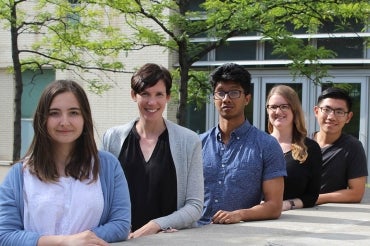#UofTBackToSchool: computer science launches second-year learning communities

Published: September 6, 2017
University of Toronto’s department of computer science is ranked one of the top 10 in the world, where undergraduates go on to publish breaking research and lead hackathons. And Jacqueline Smith, an assistant professor of computer science, teaching stream, wants to do more to ensure students have the best experience possible.
“Speaking to students last year, they were identifying a different kind of experience compared to first year, when they were learning how to be a student, doing the course work and trying to get into the program,” says Smith. “These students were finding that once they got into second year it was a whole other ballgame – they’re in, now what?”
To answer this, Smith and computer science’s Jennifer Campbell, an associate professor, teaching stream, are introducing second-year learning communities (SLCs). These learning communities will be modelled after the Faculty of Arts & Science’s first-year learning communities, which are an integral part of the first-year experience across many disciplines.
The initiative, supported by Advancing Teaching and Learning in Arts & Science (ATLAS), is the first SLC at U of T.
The SLC format will be similar in that students will meet in groups of 25 to 30 at a set time each week, co-ordinated by an upper-year peer mentor and an assistant peer mentor, but second-year activities will be focused on the field of computer science.
For instance, hackathons, where programming enthusiasts and experts work on problems, typically over a sleepless weekend, are often seen as intimidating for the first-time attendee. Smith envisions “hackathon support groups” so that students can explore skills development outside the classroom, together.
Campbell and Smith also want to answer an important question: What is computer science?
“We’re going to be painting a better picture for them: what computer science is, and what they can do with a computer science degree. There are so many more things they can do, other than programming all day.”
Campbell and Smith consulted with the Sexual & Gender Diversity Office to develop the SLC program’s application form.
“One of the things that we believe is helpful, not only for women, but for any underrepresented group, is being part of a community. It really helps people stay in computer science,” she says.
The faculty also plan to expose students to the many local career opportunities and provide support on resumé writing and technical interview skills.
“Community is an underlying theme,” says Smith. “We want to help them connect with their classmates, and be good citizens of this department and their future workplace.”



